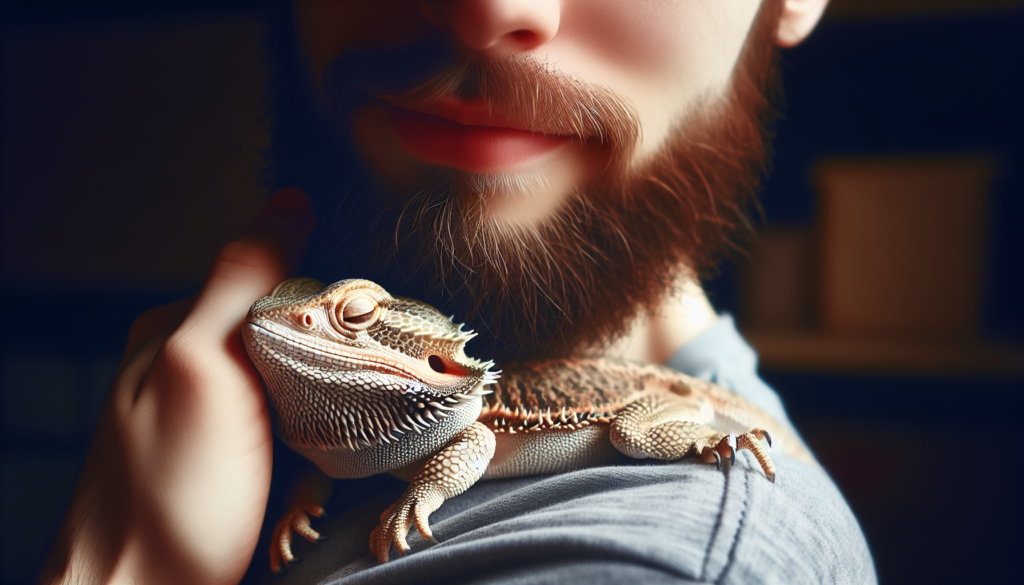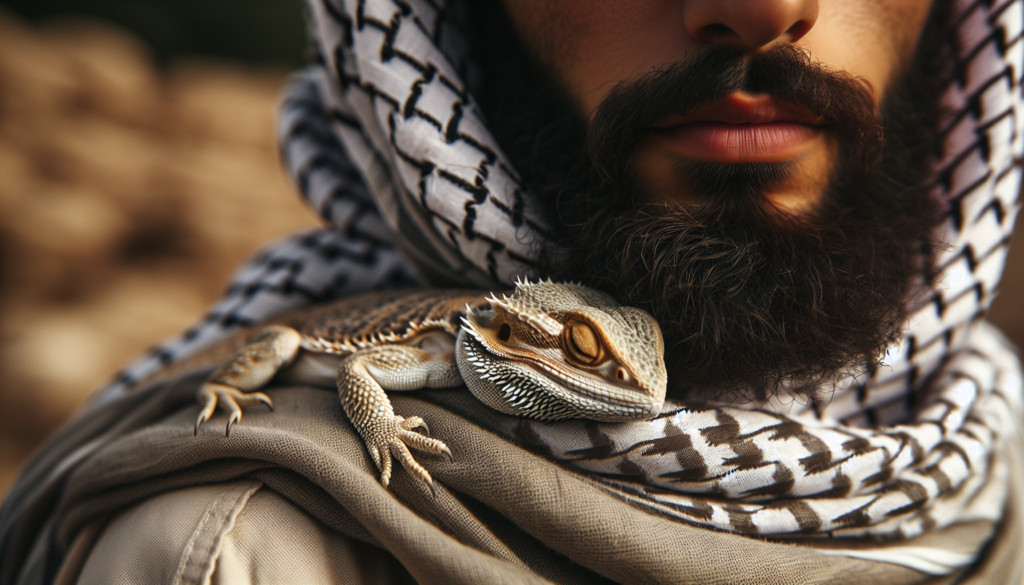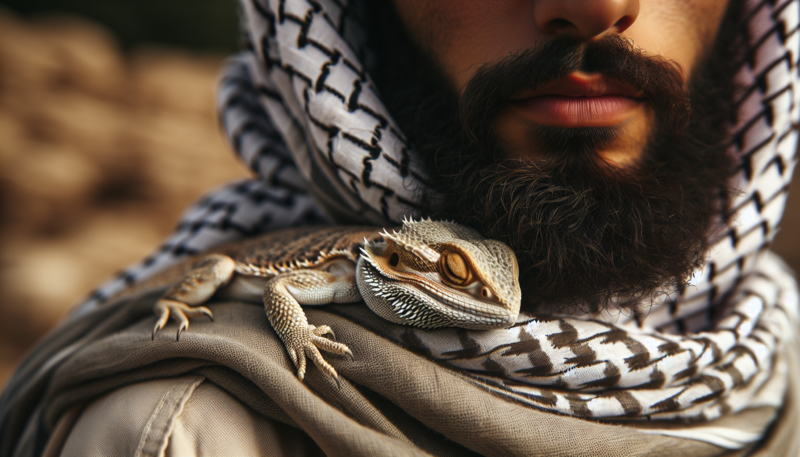Imagine this: you’re lounging on the couch, enjoying the warm afternoon sun streaming through the window, when suddenly, your bearded dragon curls up on your lap and drifts off into a deep slumber. Have you ever wondered what this adorable behavior means? Well, let’s uncover the mystery together! In this article, we’ll explore the fascinating world of bearded dragons and discover what it truly means when your scaly friend chooses you as their cozy sleeping spot. So, get ready to uncover the secrets behind your bearded dragon’s snoozing sessions!
The Behavior of Bearded Dragons
Bearded dragons are fascinating and unique reptiles that make wonderful pets. Their behavior can be quite intriguing, especially their sleeping patterns and bonding behaviors. Understanding and interpreting these behaviors is crucial to ensuring the health and happiness of your bearded dragon.
Sleeping Patterns of Bearded Dragons
One interesting aspect of bearded dragon behavior is their sleeping patterns. Bearded dragons are diurnal creatures, which means they are most active during the day and sleep at night. However, it is not uncommon for these reptiles to take short naps during the day.
Bearded dragons are known to fall asleep in various positions, including resting on top of their owners. This behavior can be a sign of trust and comfort, as bearded dragons feel secure and safe in their owner’s presence. Let’s dive deeper into the reasons why bearded dragons fall asleep on you.
Bonding Behavior of Bearded Dragons
Bearded dragons are highly social creatures and have the capacity to form strong bonds with their owners. Bonding is a two-way process that requires time, patience, and understanding. When a bearded dragon falls asleep on you, it is a clear sign of the bond and trust that has been established between you and your pet.

Reasons Why Bearded Dragons Fall Asleep on You
Comfort and Security
Bearded dragons are instinctively wired to seek out safe and secure environments. Falling asleep on you provides them with a sense of comfort and security. Your body heat and scent create a cozy and familiar environment that makes them feel at ease.
Warmth and Temperature
Bearded dragons are ectothermic creatures, meaning they rely on external heat sources to regulate their body temperature. By falling asleep on you, they can take advantage of your body heat to maintain their optimal body temperature without any effort.
Feeling of Trust
Bonded bearded dragons trust their owners implicitly. Falling asleep on you is a clear indication that your dragon feels safe and secure in your presence. They perceive you as a protector and a source of comfort.
Attachment and Bonding
Bearded dragons are capable of forming strong attachments to their owners. Falling asleep on you is a sign that they value your company and have developed a deep bond with you. It’s a moment of connection and shared closeness.
Curiosity and Exploration
Bearded dragons are naturally curious creatures, constantly seeking out new experiences and environments. Falling asleep on you may occur as a result of their desire to explore your scent, movements, and surroundings, even during their resting hours.
Social Interaction
Bearded dragons are social animals, and they thrive on social interaction. Falling asleep on you may be their way of seeking companionship and closeness. Your presence provides them with the social interaction they crave.
Factors Affecting Bearded Dragon’s Sleep
Several factors can affect the sleep patterns of bearded dragons. It is important to consider these factors to ensure your dragon gets adequate rest for its overall well-being.
Habitat Conditions
Creating a suitable sleep environment for your dragon is essential. Ensure that their enclosure provides adequate darkness, as any sources of light can disturb their sleep. Simulating natural day-night cycles with proper lighting can help regulate their sleep patterns.
Health and Well-being
A bearded dragon’s sleep patterns can be influenced by its overall health and well-being. If your dragon is experiencing any discomfort, illness, or pain, it may struggle with sleep. Regular check-ups with a reptile veterinarian can help identify and address any health issues.
Age and Activity Levels
The age and activity levels of your bearded dragon can impact their sleep patterns as well. Juvenile dragons tend to be more active and require shorter periods of rest. As they mature, they may sleep for longer durations. Monitoring their activity levels and adjusting their sleeping arrangements accordingly is crucial.

Understanding Your Bearded Dragon’s Body Language
Bearded dragons communicate through various body language cues that can provide valuable insights into their overall well-being. Understanding these cues is essential for recognizing signs of comfort or distress.
Closed Eyes
Closed eyes often indicate that a bearded dragon is at ease and comfortable. If your dragon falls asleep with its eyes closed, it is a positive sign that they trust their surroundings and are enjoying their nap.
Relaxed Body Posture
A relaxed and calm body posture indicates that your bearded dragon is content and at ease. When they are asleep, their body will be loose and unthreatened, signaling a state of relaxation.
Limp Limbs
If your dragon falls asleep with limp limbs, it is a sign of complete relaxation and comfort. This suggests that they have no concerns or worries in their current environment.
Puffed Beard
A puffed beard can indicate various emotions in a bearded dragon, including aggression or stress. However, if your dragon falls asleep with a slightly puffed beard, it could simply be a result of their relaxed state.
Heavy Breathing
Bearded dragons have a naturally slow breathing rate. When they are asleep, their breathing should remain steady and calm. Heavy or irregular breathing patterns may signify an underlying health issue and should be monitored closely.
Snoring Sounds
While it may sound amusing, snoring sounds in bearded dragons can be a cause for concern. Snoring can be an indication of respiratory problems or an obstruction in their airways. Consulting a reptile veterinarian is advisable if snoring sounds persist.
Creating a Safe and Comfortable Environment for Your Bearded Dragon
Providing your bearded dragon with a safe and comfortable environment is essential for their overall well-being. Here are some factors to consider when creating their habitat:
Proper Lighting and Heating
Bearded dragons require specific lighting and heating conditions to thrive. providing them with a full-spectrum UVB light source and a basking spot that mimics their natural habitat is crucial. This ensures proper digestion, vitamin D synthesis, and temperature regulation.
Optimal Humidity Levels
maintaining appropriate humidity levels in your dragon’s habitat is essential for their health. Bearded dragons need a relatively low humidity environment, so it is important to monitor and adjust humidity levels accordingly.
Appropriate Substrate
Choosing the right substrate for your bearded dragon’s enclosure is important. Avoid using loose substrates like sand or wood chips, as they can be ingested and cause digestive issues. Opt for reptile carpet or non-toxic liners instead.
Adequate Hideouts and Basking Spots
Bearded dragons require a variety of temperature zones in their enclosure. Provide multiple hideouts and basking spots to allow them to regulate their body temperature as needed. This allows them to choose the area that best suits their comfort.
Peaceful and Stress-free Surroundings
Bearded dragons are sensitive creatures, and excessive noise or disturbances can cause stress. Ensure their enclosure is located in a quiet area of your home, away from high-traffic zones or loud noises.
Regular Vet Check-ups
Regular visits to a reptile veterinarian are crucial for maintaining the health and well-being of your bearded dragon. These check-ups allow for early detection and prevention of any potential health issues.
The Importance of Bonding with Your Bearded Dragon
Bonding with your bearded dragon is not only a rewarding experience for you, but it is also essential for their emotional well-being. Here are some ways to strengthen your bond:
Developing Trust and Mutual Feelings
Building trust with your bearded dragon takes time and patience. Allow them to come to you at their own pace, respect their boundaries, and handle them gently. Creating a safe and nurturing environment plays a significant role in developing trust.
Handling and Interacting with Your Dragon
Regular interaction with your bearded dragon helps establish a bond. Handling them gently and providing positive reinforcement with treats or praise can make them feel comfortable and secure in your presence.
Recognizing Individual Preferences
Each bearded dragon has unique preferences and personalities. Understanding your dragon’s likes and dislikes will help tailor your interactions to their specific needs. Pay attention to their body language and adjust your approach accordingly.
Engaging in Playful Activities
Providing opportunities for play and mental stimulation is crucial for a happy and well-rounded bearded dragon. Offer toys, puzzles, and supervised exploration time outside of their enclosure to keep them active and engaged.
Offering Nutritious Diet
A well-balanced and nutritious diet is vital for the overall health of your bearded dragon. Providing a variety of gut-loaded insects, leafy greens, and occasional fruits helps ensure they receive the essential nutrients they need.
Potential Health Concerns and Signs of Discomfort
As a responsible bearded dragon owner, it is important to be aware of potential health concerns and signs of discomfort. Prompt identification and addressing of these issues can prevent further complications.
Inadequate Temperature Regulation
Inability to regulate body temperature can lead to serious health issues in bearded dragons. Signs of discomfort include excessive hiding, lethargy, lack of appetite, or spending excessive time near heat sources. Seek veterinary care if you suspect temperature regulation issues.
Respiratory Problems
Respiratory infections are common among bearded dragons and can result from inadequate husbandry or exposure to cold temperatures. Signs of respiratory problems include wheezing, difficulty breathing, nasal discharge, or open-mouth breathing. Immediate veterinary attention is necessary.
Stress and Anxiety
Bearded dragons can experience stress and anxiety due to a variety of factors, such as improper handling, loud noises, or sudden environmental changes. Signs of stress include loss of appetite, aggression, excessive hiding, or unusual behaviors. Identify and eliminate stressors to promote a calm and healthy environment.
Malnutrition and Dehydration
Inadequate diet and improper hydration can lead to malnutrition and dehydration in bearded dragons. Signs of these conditions include weight loss, sunken eyes, dry skin, or lack of appetite. Ensure a varied and nutritious diet and provide access to fresh water at all times.
Parasite Infestation
Internal and external parasites, such as worms or mites, can cause significant discomfort and health issues in bearded dragons. Signs of infestation include weight loss, lethargy, changes in feces, or abnormal shedding. Consult a reptile veterinarian for a proper diagnosis and treatment.
Other Health Issues
Bearded dragons may be susceptible to various other health issues, such as metabolic bone disease, liver disease, or egg-binding (in females). Regular veterinary check-ups and monitoring for any unusual behaviors or symptoms are vital for early detection and intervention.
Seeking Professional Advice
Being a responsible bearded dragon owner often requires seeking professional advice and support. Connect with reptile veterinarians and reptile enthusiast communities to gain knowledge, share experiences, and ensure the well-being of your dragon.
Consulting a Reptile Veterinarian
Reptile veterinarians are a valuable resource when it comes to understanding the specific needs of your bearded dragon. Schedule regular check-ups and consult them for any concerns, such as health issues, behavioral changes, or husbandry-related queries.
Educating Yourself about Bearded Dragon Care
Continuous learning and staying informed about proper bearded dragon care is essential. There are numerous reputable resources available, including books, online forums, and websites dedicated to reptile care. The more knowledge you have, the better equipped you will be to provide optimal care.
Joining Reptile Enthusiast Communities
Engaging with fellow reptile owners and enthusiasts can provide support, advice, and a sense of belonging. Join online communities or local reptile clubs to connect with like-minded individuals who share your passion for bearded dragons.
Conclusion
Understanding the behavior of bearded dragons, including their sleeping patterns and bonding behaviors, is crucial for building a strong relationship with these captivating reptiles. Recognizing the reasons behind their sleeping habits, creating a safe environment, strengthening the bond, and being vigilant about their health are vital aspects of responsible bearded dragon ownership. By prioritizing their well-being and providing a loving and nurturing environment, you can ensure a happy and fulfilling life for your bearded dragon.
